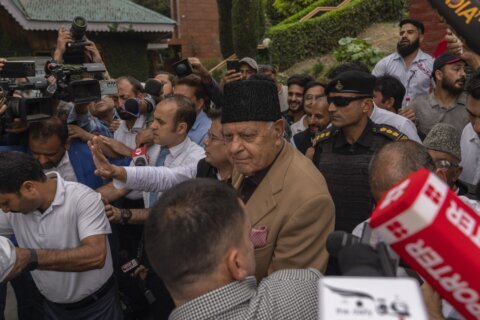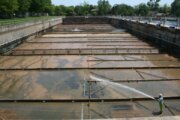As the coronavirus pandemic continues to show signs of receding across much of the United States, excited Americans might be eager to celebrate by setting off more fireworks than usual this Fourth of July.
Scientists are begging them not to — at least in the West, where conditions are ripe for a blaze.
More than 150 fire scientists and officials have signed a letter — published by The Conversation on Wednesday — urging people to skip the fireworks this year even as Americans become more comfortable congregating, amid a stretch of dangerously hot and dry weather in the Pacific Northwest. A recent Axios-Ipsos poll found that 41% of U.S. adults believe attending a July Fourth celebration this year carries either a moderate or high risk, but this percentage is down from 78% when the same question was asked a year ago.
[READ: The 10 Most Patriotic States]
“We are gravely concerned about the potential for humans to accidentally start fires — from fireworks and other activities — by adding ignitions to this combination of historic drought, heat, and dry vegetation,” the letter reads. “We urge people to skip the fireworks this July 4th and to avoid other activities that could start an unintentional wildfire. This will be critical for a safe Independence Day holiday, good practice for the rest of the fire season and one way we can adapt to more safely live in increasingly flammable landscapes.”
Cities in Oregon and Washington set new temperature records on Monday, reaching well over 100 degrees Fahrenheit, according to Reuters. Oregon’s capital city of Salem reached 117 degrees — the highest temperature since those records started being kept in the 1890s, Reuters reported. The state suffered a devastating wildfire season in 2020, with fires burning at least 1 million acres across Oregon.
With the July Fourth holiday’s long tradition of fireworks, fires from human sources see a massive spike on that date, especially in the West, according to data analyzed by The Conversation. More than 7,000 U.S. wildfires started on July 4 from 1992 to 2015 — the most on any day during the year, the outlet also reported.
Fireworks don’t just spark wildfires. A homemade, illegal fireworks cache exploded as it was being destroyed by a bomb squad in Los Angeles on Wednesday night, injuring 17 people in the process, according to The Associated Press. Ralph Terrazas, the city’s fire chief, told the AP that Los Angeles sees “devastation and destruction” every year from fireworks, despite them being illegal to sell or possess.
Some Western officials are taking action. Several Oregon cities and counties have already put “temporary (fireworks) bans in place due to weather and community concerns,” according to Alison Green, the public affairs director for the Office of the State Fire Marshal. As of July 1, those locations include Bend, Portland, Clark County, Clackamas County and Deschutes County, Green noted. Other areas in the state have “restricted the timeframe in which legal fireworks can be used this year.”
“As you can imagine, with our recent temperatures and last year’s fire season, fireworks have recently been at the forefront of quite a few discussions,” Green said via email. “Residents and local jurisdictions working with elected officials, both at the state and local level, is the best way to change how fireworks are used in Oregon.”
In Salem, fireworks have not been banned for the holiday weekend, but officials there are asking residents to be cautious, according to the Statesman Journal. July Fourth fireworks events have been canceled in Beaverton and Seaside, Oregon.
In Washington, where fireworks are banned in Western parts of the state and on all public lands, the Department of Natural Resources is similarly asking residents to skip fireworks displays over the long weekend due to the heat and dry conditions, KING-TV reported. The department also has a burn ban on all of its 13 million acres of protected lands, according to Janet Pearce, the communications manager for the Washington Department of Natural Resources.
“We are encouraging people to refrain from using fireworks because our landscape is becoming crispy,” Pearce said in a statement. “With the record-breaking temperatures we saw last weekend, our state is bone dry and the risks from fireworks makes the situation even more precarious.”
Other state officials, however, are fighting against the push to avoid fireworks this year. South Dakota Gov. Kristi Noem, a Republican, sued the Joe Biden administration in April for not allowing the state to hold a July Fourth fireworks show over Mount Rushmore. The lawsuit — which was later dismissed, according to the Argus Leader — came after the National Park Service initially denied a request from the state, citing risks for the park, its employees and visitors. An Independence Day fireworks show was held at the memorial last year — amid the pandemic — for the first time since 2009, after it had been prohibited for years due to wildfire concerns.
[MORE: In Some States, 80% of Adults Have Received at Least 1 COVID-19 Vaccine Dose]
Elsewhere in the country, some states are forging ahead on festivities. About 70% of July Fourth celebrations are scheduled to return this year and “many of those fireworks displays will be bigger and better than pre-pandemic levels,” according to a news release from the American Pyrotechnics Association. The release notes that the nation’s largest Independence Day event will be in Nashville, featuring the “biggest fireworks display in the city’s history.”
More from U.S. News
In Some States, 80% of Adults Have Received at Least 1 COVID-19 Vaccine Dose
Oregon Farmers Face Dual Struggles With Pandemic, Wildfires
Experts Urge Caution With July 4 Fireworks in West Amid Heat Wave originally appeared on usnews.com







